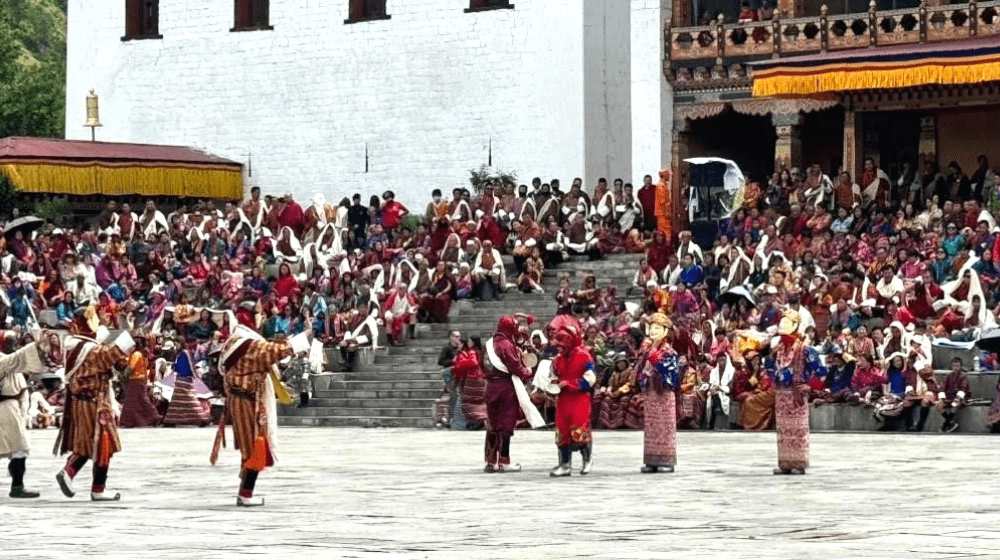Tshechu festivals are usually a celebration of Bhutanese culture and traditions. It is a religious event and a large social gathering, held every year in various temples, monasteries and dzongs across Bhutan, during which people from various villages come together to witness the religious mask dances to receive blessings. It is believed that everyone must witness the mask dances at least once in their lifetime to wash away the sins and when a person dies, the wander in the Bardo (intermediate state) will be able to recognize the Buddha who will be in terrifying form, and lead the wander to paradise. Those who have no adoration for such events, do not recognize the Buddha and are frightened.
Mask dances are usually performed mainly to convey religious messages to the people. During the mask dances, it is believed that the deities of tantric teaching are invoked and through their power and blessings, misfortunes are removed. In 2018, UNFPA collaborated with the Central Monastic Body and the Royal Academy of Performing Arts (RAPA), to integrate social messages on prevention of gender-based violence and harmful practices into the relevant mask dance narration. Since then, many of the districts have been delivering the social messages through the mask dance narratives. A book entitled “Druk Gi Tsechu Garcham Gi Sheba” was published as a guide to convey social messages during the various mask dances performed at the festival. Subsequently, the commentators of the festival were trained based on the book. This program is carried out in partnership with the Commission for Religious Organization of Bhutan and RENEW.
Pa cham, performed by males, and Rigma Chudu, performed by females, both pay homage to Guru Rinpoche, signifying that both genders have held equally important roles in worship since his time. This underscores the importance of gender equality and women’s participation. Women and girls are encouraged to step forward and embrace every opportunity.
Similarly, the popular Pho Lay and Mo Lay cham, which is performed in most of the annual festivals across the country, based on folk tale of king Norzang, portrays a conflict between husband and wife that leads to loosing of her nose. It conveys lesson on how to lead a harmonious life with unwavering love and faith and at the same time social message is reinforced on the importance of challenging harmful social and gender norms that justifies hitting wife and accepting violence.
This year UNFPA is working with the religious organizations under the Commission for Religious Organization of Bhutan and Dzongkhag Rabdeys to train cultural and religious officials from districts across the country on how to convey social messages related to GBV prevention and reproductive health during mask dance performance.
A three-day training on Druk Gi Tsechu-yi Garcham Ge Sheba for religious personnel and cultural officers from various religious organizations and Dzongkag Rabdeys concluded on 28th September 2024. The closing ceremony was honored by the presence of Dasho Dzongda, the District Governor of Bumthang, who awarded certificates to the participants. Dasho expressed deep appreciation to the religious community for undertaking such initiatives to benefit the broader community. The similar training will be held in Trashigang in a following week.


